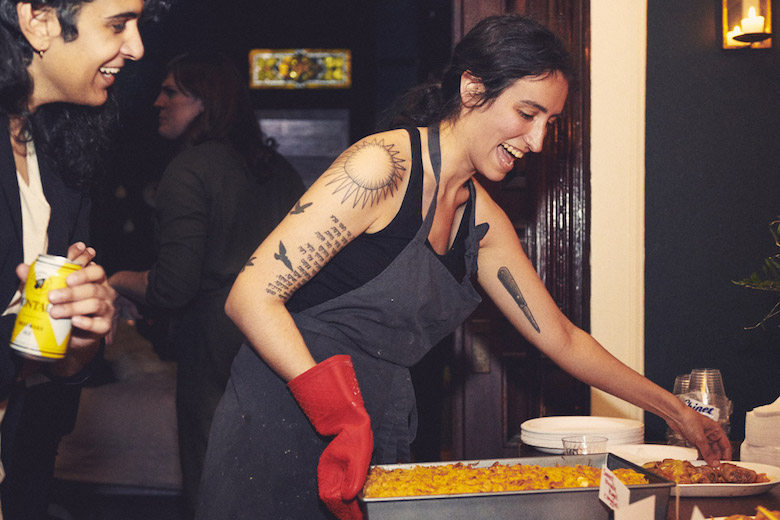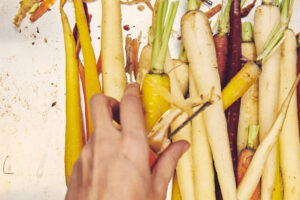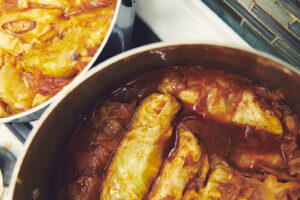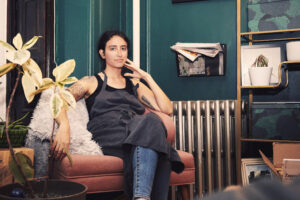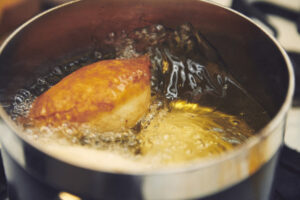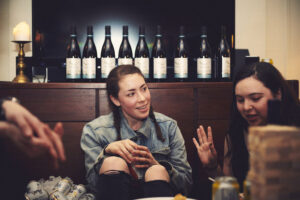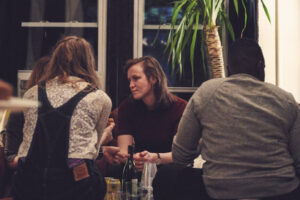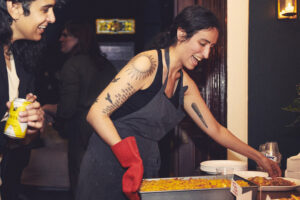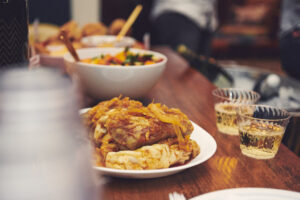
“Anyone who looks at the queer movement and says we’ve done our part for people of color and the trans community are not reading the news. We haven’t taken a stand for them in the same way we have for mainstream white gay issues,” says Alex Koones, a 29-year-old Brooklyn-born chef.
Koones, a lifelong activist in the queer movement, turned to food to help heal historical divisions in the LGBTQIA community. Shortly after the Pulse shooting in 2016, she founded Babetown, a pop-up dinner party that brings queer women, trans and non-binary people together in a relaxed environment free from harassment, racism and transphobia.
There’s nothing flashy about Babetown or the crowd it draws—a multicultural mix of non-binary bohemians, tattooed queers, power lesbians and trans femmes, most of whom are working class. “We don’t come from a glamorous generation,” says Koones. “We come from a generation that graduated college to a broken workforce and is struggling. Struggling to find a community.”
Babetown’s affordable $35 tickets sell out within hours and cover the cost of food and drink supplied in different homes throughout Brooklyn (and occasionally other boroughs) each month. It isn’t so much a hearty sit-down dinner as it is a grown-up house party with light grazing, heavier drinking and intimate mingling. Menus are structured seasonally around what can be sourced from queer and PoC-run farms upstate and include options for vegans and vegetarians. Changing themes bring a range of cultures, talents and issues to the table for people to show and tell (and taste).

Koones jokes that she’s just an “awkward working-class line cook throwing a party in someone’s house,” but the work she and her friends are doing—and the parties themselves—are part of a larger ripple effect. When Babetown started, Koones says there weren’t any other queer supper clubs in the city, but within a year and a half—and following fresh waves of racist, anti-immigrant and transphobic sentiment—the dinner party format has evolved as a platform for queer activism. Babetown recently partnered with another pop-up dinner, Queer Soup Night (a donation-based event founded by Liz Alpern that gives all of its proceeds to a different charity each month), to raise funds for a small organic farm in Brooklyn that teaches youth and adults farming skills.
Koones’s love for hosting queer dinners began in her early 20s as a respite from college and grueling restaurant work. “My relationship with dinner parties was like some people’s relationship with shoes. I’d spend all my money on food and then have none left for the rest of the week,” she laughs. “But cooking for others gives me comfort. It’s really the only thing that alleviates my anxiety.”

When she became a line cook, preparing home-cooked meals for friends interrupted long hours spent working under intense pressure in New York City kitchens like the NoMad, Breslin, Jean Georges and St. Anselm, environments that she says were rich with creativity and innovation yet reeked of abuse, misogyny, homophobia and harassment. “I made no money, I had no life, and I struggled day to day just to get by,” Koones sighs. “I don’t think that great food is coming from anxious, terrified hands. Good food comes from happy hands.”
Long before she entered the professional culinary world, Koones learned to weave challah as a young girl in her rabbi’s kitchen, surrounded by Orthodox Jewish women whose “hands moved at the speed of light,” and at age 22, crafted scrappy meals for transients at a lesbian separatist commune in New Orleans. Each experience has influenced her culinary style today, and her Sephardic and Ashkenazi roots often find their way on the menu, like fried sweet potato latkes at Babetown Shabbat and za’atar-spiced popcorn and halva bites at Babetown Movie Night.

For Koones, food offers a tangible way to preserve heritage yet subvert traditions that celebrate colonialism and capitalism, or have historically excluded people of color and non-religious folks. Holidays also come with immense pressure to “tone down and staightify who we are for families who we desperately want to accept us,” Koones explains, so her goal is to create space where people can experience a meal that “maybe they’ve had a million times before, but up until now never got to fully enjoy.”
The mission of Babetown is simple: “to bring out the best in people, to build space where we can be ourselves and celebrate who we are, to celebrate our queerness,” Koones continues. “There might be times where I succeed and times that I fail, but that’s the goal.”
This piece originally ran on January 19, 2018.


